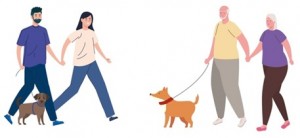 Sometimes, ordinary acts can be the solutions to challenging and complex problems.
Sometimes, ordinary acts can be the solutions to challenging and complex problems.
A professor, a man in his late 60s, walked down the farmers’ market every day, whether on freezing winter days or hot, humid summer ones. He would stop at a few booths and buy some vegetables, fruits, nuts, or meat. He would also pass by other sellers, smiling and greeting them as friendly acquaintances. This was a daily stop for the elderly man on his way from work to home (an extra 20–30-minutes added to his 20-minute walk each way). He stayed with this routine for decades and in doing so, outlived many of his colleagues and friends. He lived into his 80s even though he had a family history of cancer and had poor health during his youth and middle age.
A tiny lady walked around local department stores virtually every day after she finished her accounting job that demanded sitting for long hours. Sometimes she bought clothing or necessities for her children, whereas at other times she was just window shopping or walking along. Her relatives were always puzzled about what attracted her to those stores where they had the same merchandise almost every day. They didn’t realize that her “go shopping” was simply her daily “relaxation activity routine.” A result of her spending decades in that home-workplace-department store route was that the lady has lived well up into her 90s.
I witnessed these real-life anecdotes because this man and woman are my parents.
These stories reflect at least one simple thread – Walking matters. Daily walking can bring substantial health benefits!
Cancer touches each of us so much, so deep, and there is no cure for it currently despite medical and technological advances, as is the case for some other debilitating chronic diseases.
Of course, the best cure would be prevention! As everybody knows, “An ounce of prevention is worth a pound of cure.” Of various risk factors, physical inactivity is a major one. However, it is increasingly common in our modern life. As the saying goes, “sitting is the new smoking.”
To prevent cancer, heart disease and improve one’s overall health, the American Heart Association recommends that all adults to get at least 150 minutes exercise per week with moderate intensity. The American Cancer Society has also advised on being physically active: particularly, adults should get 150-300 minutes of moderate-intensity or 75-150 minutes of vigorous-intensity activity each week (or a combination of these).
I’ve seen that a majority of people don’t meet these guidelines based on my experience in public health. I also understand how difficult it is for many busy folks to fulfill this goal due to the demands of their work and family life. Accordingly, for years, I’ve shared some practical ways for daily exercises.
Today, I would make it even simpler—if time is a problem—by suggesting to start small in terms of walking and its feasibility. If it’s really challenging for you to exercise 30 minutes a day and 5 days a week, how about walking ~20 minutes a day and 7 days a week? Or alternatively, any combination that may fit your schedule? Cumulativeness counts too and is better than nothing. You may divide 30 minutes into a 10- or 15-minute walk first thing in the morning, and 10 minutes of walking-oriented activities during the day (for examples, running up stairs, parking farther away from a destination, or walking to a local store). Then ideally, add 5-10 minutes more of activity (say dancing, jumping, gardening, or playing with the kids).
There is no need to reiterate the well-documented, numerous health benefits of walking at this time. While I’m stressing not to underestimate the power of walking, it’s important to engage in various physical activities, along with a balanced diet, weight control, adequate sleep, and living a healthy lifestyle for your overall well-being.
Doing nothing is like waiting for a miracle that much likely won’t happen soon. So, simply getting up from your chair to get moving is your best regime and the first step in disease prevention.
Happy walking!
